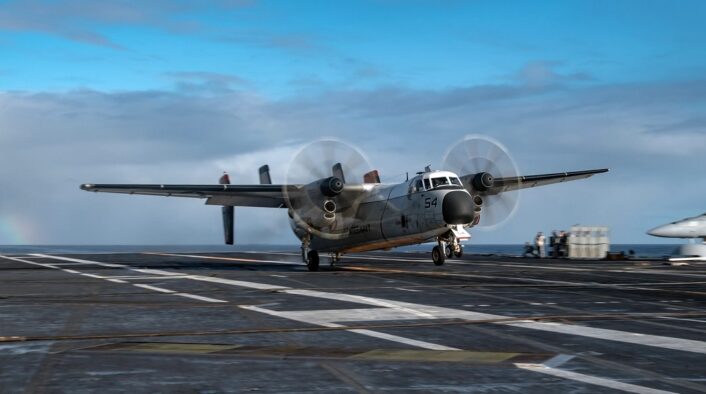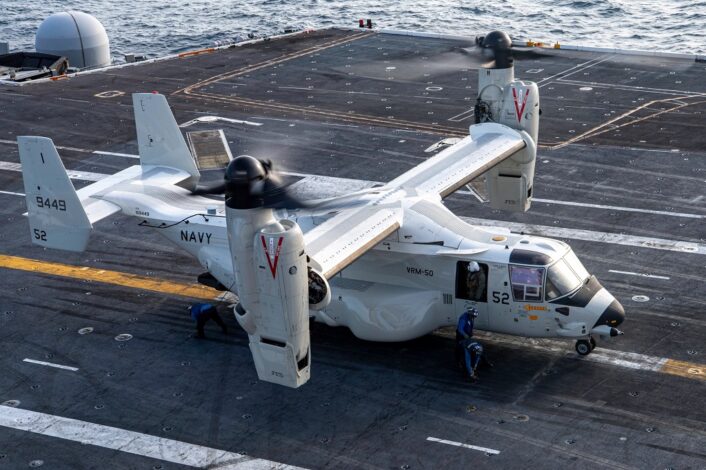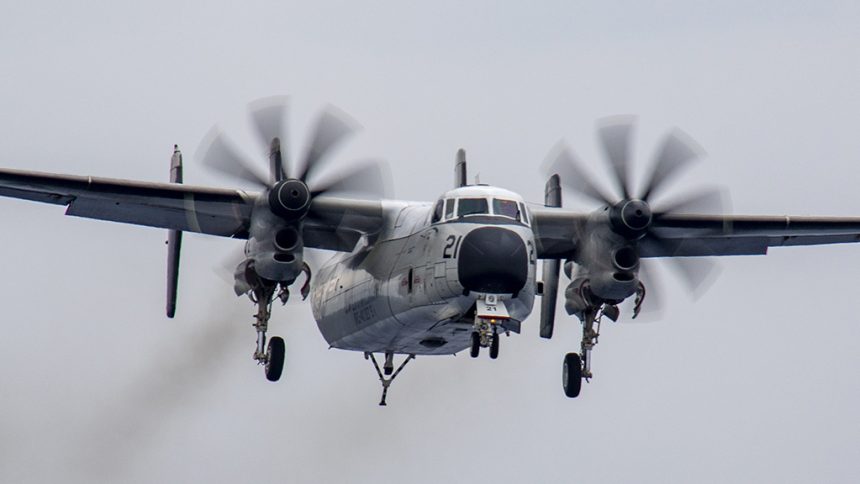The last 15 C-2As are surging to meet the carrier onboard delivery mission after all Ospreys were grounded in December, with DOT&E meanwhile reporting that the CMV-22 is not operationally suitable.
The U.S. Navy is surging the last C-2A Greyhound squadron, Fleet Logistics Support (VRC) 40, to replace the new CMV-22B Osprey after the tiltrotor remains grounded more than two months after the deadly incident of an Air Force CV-22 in December 2023. The grounding forced the Navy to swap out the embarked CMV-22 with the C-2 in order to continue to meet the Carrier Onboard Delivery mission.
The Navy planned to retire the last 15 Greyhounds by 2026, replacing them with 38 Ospreys. The transition to the new COD aircraft was already completed on the West Coast, so now the East Coast’s VRC-40 is flying the COD mission for the West Coast carriers USS Carl Vinson and USS Theodore Roosevelt.

“Lucky for the Navy the C-2 Greyhound is still available,” Air Boss Vice Adm. Daniel Cheever said in a panel at the WEST 2024 conference. “Limited operational impacts at this point but there are still operational impacts. And as you look into the future, significant operational impacts.”
The V-22s operated by the U.S. Air Force, Navy and Marine Corps, as well as the ones of the Japan Ground Self Defense Force, have been grounded following the crash that involved a USAF CV-22B off the coast of Yakushima Island, Japan, on Nov. 29, 2023. The worldwide standdown was ordered after preliminary investigation information indicated a potential materiel failure caused the CV-22B crash, killing 8 crew members.
The V-22 Osprey have a long story of groundings following mishaps. The latest one is the third safety standdown since a U.S. Air Force CV-22B carried out an emergency landing in a natural reserve in Norway and remained stranded there for six weeks in 2022. There is uncertainty about how long the current grounding will continue.

To make the matter worse, the Director, Operational Test and Evaluation (DOT&E), reported after the first Follow-On Operational Test and Evaluation (FOT&E) that the CMV-22B is not operationally suitable due to failures of many subsystems, with the ice protection system accounting for 44 percent of the total operational mission failures. Analysis of the data from the second FOT&E, scheduled to be complete in early 2024, is currently ongoing for a new assessment of the operational suitability.
The CMV-22B achieved initial operational capability (IOC) in December 2021, with the full operational capability (FOC) expected in 2024, a year later than initially planned. The CMV-22B is based on the MV-22B design with several changes to support the COD mission: increased fuel capacity to extend the range, fuel jettison system, integrated public address system for making announcements in the cabin area, high-frequency radio for over-the-horizon communications, and cabin and cargo lighting to assist with cargo loading.
Specifically, the CMV-22B will be capable of transporting up to 6,000 pounds of cargo and/or personnel over a 1,150 nautical mile range. This expanded range is due to the addition of two new 60 gallon tanks installed in the wing for an additional 120 gallons of fuel and the forward sponson tanks were redesigned for additional capacity. The aircraft will also be capable of internally transporting the F-35C Lightning II engine power module, a key point that led to the choice of the Osprey for the COD mission, as it was too large to fit inside the C-2’s cargo bay.









